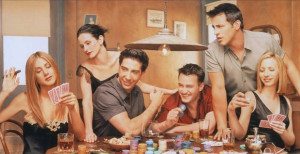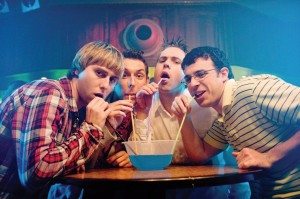British vs. U.S. comedy
Anyone who has known me for even a small amount of time is probably aware that I’m simply a fanatic about British comedy. I mostly reserve the peak of my passion for my all-time favourite TV series Green Wing; a brilliant blend of surreal sketch like scenes, comedy gold characters and some excellent writing, which make it both hilarious and also quite dramatic at some points. No other show makes me laugh as much whilst also giving me such a great sense of empathy for its characters.
Contrasting this brilliantly flowing, well written, piece de resistance with the likes Scrubs is really a little unfair, but both are sitcoms set in hospitals and attempt varying levels of dry humour, so some comparison can be made. Thankfully Scrubs doesn’t make use of the grating, canned laugh track found on many of its other American counter-parts, but it still has an annoying habit of employing gimmicky sound effects that do nothing but interrupt the shows flow and are still supposed to be hints at when the audience should supposedly laugh.
 Canned laughter is practically an epidemic in American sitcoms; The Big Bang Theory, Friends, Mike and Molly, How I Met Your Mother and Frasier all use it, to name but a few offenders. Now that’s not to say that most 20th century British comedy gold (Fawlty Towers, Dad’s Army, et cetera…) doesn’t use it, but they at least used it with some tact and style, not rhythmically inserting it every 10 seconds and expecting the audience to laugh when the show’s producers demand it.
Canned laughter is practically an epidemic in American sitcoms; The Big Bang Theory, Friends, Mike and Molly, How I Met Your Mother and Frasier all use it, to name but a few offenders. Now that’s not to say that most 20th century British comedy gold (Fawlty Towers, Dad’s Army, et cetera…) doesn’t use it, but they at least used it with some tact and style, not rhythmically inserting it every 10 seconds and expecting the audience to laugh when the show’s producers demand it.
With the exception of some of the older gems, most of the comedy I watch doesn’t feel the need to rely on a corny laugh track with the I.T Crowd being a notable exception, but there is a redeeming lack of overuse. In fact, American drama’s that have an element of comedy and don’t tend to use a laugh track such as Firefly and Desperate Housewives actually tend to tickle my funny bone far more acutely and have definitely earned my respect.
The annoying habit of employing gimmicky sound effects does nothing but interrupt the shows flow
My real bone of contention with canned laughter is that it completely inhibits a shows flow and pacing as the characters stare vacantly into the camera for two seconds, before reeling off another overused and clichéd one liner. It’s all just too stilted and leads me to believe that the actors in these shows are hardly anything special and that almost anyone could do their job. With Green Wing and Friday Night Dinner, Mark Heap is the only man I can imagine in his roles as they actually require some talent to portray, the same with Noel Fielding’s character ‘Vince Noir’ in The Mighty Boosh. Jim Parson’s attempts at being a snotty scientific smart-arse when talking about things that anyone can understand with relative ease, could be carried off by most GCSE physics students; they might even have more charisma.
 The divide in comedy is best displayed for me when an originally British show is taken over to the states. The best example of which is when The Inbetweeners was taken state-side after huge success in Britain only to be mauled and run into the ground. The actors themselves in the American version didn’t seem to really understand the type of characters they were trying to portray and the writing was almost identical except for the removal of some the best dry wit in the entire show. It has to be acknowledged that this is by far the worst example of a show moving across the pond, but it amply highlights most of the main deficiencies in American comedy.
The divide in comedy is best displayed for me when an originally British show is taken over to the states. The best example of which is when The Inbetweeners was taken state-side after huge success in Britain only to be mauled and run into the ground. The actors themselves in the American version didn’t seem to really understand the type of characters they were trying to portray and the writing was almost identical except for the removal of some the best dry wit in the entire show. It has to be acknowledged that this is by far the worst example of a show moving across the pond, but it amply highlights most of the main deficiencies in American comedy.
Another aspect of British comedy that I feel excels in comparison with American efforts is an element of muted surrealism that is elegantly interwoven into many brilliant shows such as Spaced and the The Mighty Boosh, with both shows engaging my imagination as much as my funny bone. That said, moving away from live-action American attempts at comedy and looking at some of the comedic cartoons they produce, this is less the case.
Both Matt Groening and Seth Macfarlane via their various series, Futurama and Family Guy being my two favourites, are adept at dipping in and out of some pleasingly surreal situations and certain characters, such as Adam West, in Family Guy are just the kind of nutter a show sometimes needs. Upon more reflection it also becomes obvious that the cartoons don’t use canned laughter and are sometimes equally good at having an appealing dramatic element, with the relationship Fry and Leela share in Futurama, being genuinely charming and heart-warming as often as it is funny. The ability to actually put good drama writing into comedy is massively underrated and is why Spaced and Green Wing rank so highly for me.
This does lead me to the conclusion that as much as I feel British sitcoms walk the contest, American cartoons are actually something that hold my attention to a similar standard and are comparatively much better than Britain’s offerings in this area. On this note it’s fair to concede that I don’t really abhor any American comedy (with the exception of The Big Bang Theory), I just feel it lacks a stylistic panache and that’s why I will always most likely prefer a British offering. That said, it all hinges on the subjective nature of comedy and at the end of the day I’d rather there was choice than any one person went without adequate laughter in their life.

Comments